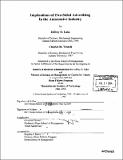Implications of two-sided advertising in the automotive industry
Author(s)
Luke, Jeffrey O. (Jeffrey Oliver), 1967-; Vessels, Charles M. 1964-
DownloadFull printable version (4.830Mb)
Other Contributors
Sloan Fellows Program.
Advisor
Christian Dussart.
Terms of use
Metadata
Show full item recordAbstract
The extreme competition in the automotive industry results in razor-thin profit margins as original equipment manufacturers (OEMs) compete for market share and profits which increase shareholder value. Product differentiation thus becomes a key strategy used by OEMs to attract consumers to their products. The typical product and/or service value proposition for an automotive manufacturer is composed of the following attributes: Quality (segment leading or equivalent); Reliability and Durability (segment leading or equivalent); Price (competitive within segment); Styling (meets or exceeds expectations of targeted segment); Performance (meets or exceeds expectations of targeted segment); and Features and Functions (competitive within targeted segment). To support an OEM's products in the marketplace, effective marketing and advertising strategies should build brand awareness and familiarity which induces consumers, both "loyal" and "avoiders," to traverse the purchasing funnel and eventually purchase. To this end, the concept of "Two-sided Messaging" is used by OEMs as one advertising strategy. The use of"Two-sided Advertising" has been widely studied and debated as to its effectiveness when compared to "One-sided Adverting" strategies. This thesis compares and contrasts the concepts of"Two-sided" and "One-sided" advertising. We discuss advertising strategies used in the automotive industry today, review past OEM (i.e., non-General Motors) Two-sided advertising situations, and review and discuss the current GM "Quality Advertising Campaign," also known as the "Road to Redemption" (R2R) advertising campaign.
Description
Thesis (M.B.A.)--Massachusetts Institute of Technology, Sloan School of Management, 2004 [first author]; and, (S.M.)--Massachusetts Institute of Technology, Sloan School of Management, 2004 [second author]. "In conjunction with the Sloan Fellows Program." Includes bibliographical references (p. 101-106).
Date issued
2004Department
Sloan Fellows Program.; Sloan School of ManagementPublisher
Massachusetts Institute of Technology
Keywords
Sloan School of Management., Sloan Fellows Program.